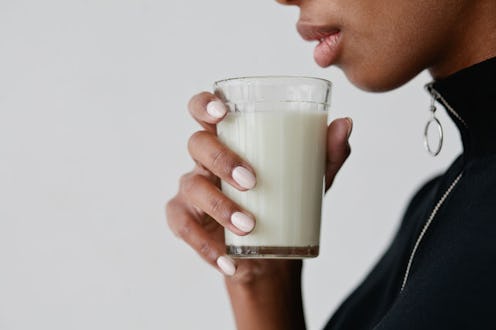Life
Synthetic Breast Milk Is The New Wellness Trend Offering Some Pretty Wild Benefits

How far would you go to boost your wellbeing? There have been a lot of outlandish wellness trends over the past few years promising to improve our mood, boost our energy levels, or give us a better night’s sleep. Remember when goat yoga was genuinely a thing? Or the time when wellness gurus were recommending we steam our vaginas to release energy? Now there is a new trend to look out for, which involves Hhman milk oligosaccharides (or HMOs, as they’re more commonly referred to). So, what is synthetic breast milk, and why is it being talked about at the moment?
You may associate it with newborn babies but, according to some experts, breast milk — or at least a specific ingredient within it — could be the next big breakthrough in health.
What Is Synthetic Breast Milk?
Well, it’s likely that you’ve already tapped into this trend, but you were too young to remember. Synthetic breast milk is the formula we feed babies either instead of or alongside the mother’s breast milk. Over the years, brands like Nestle have ploughed a lot of resources into research to improve their recipes and ensure that they offer babies the closest equivalent to the real thing.
The growing interest in synthetic breast milk surrounds one particular ingredient, though. Human milk oligosaccharides (or HMOs, as they’re more commonly referred to) are indigestible sugars and the third most common solid in breast milk, after lactose and fat.
What makes HMOs so special is that they’re not broken down by your digestive system, so they can reach your colon and help the bacteria thrive. Studies have shown that HMOs help to strengthen immune systems and improve gut health. There are some reports that they could even help with cognitive functions.
Baby formula brands such as SMA Baby and Similac use synthetic HMOs in their recipes.
“We are continually learning about the benefits of HMO on the immune system, digestion, cognition and beyond – for various stages of life,” explains Rachael Buck, research fellow at Abbott Laboratories, which creates Similac.
“We know that the immune system plays a critical role in lifelong health – from the most fragile premature babies, to those with digestive issues, allergies, and other inflammatory diseases,” says Buck. “More research must be done, but the potential of HMOs is vast.”
So, Why Are We Talking About It Now?
HMOs have hit the headlines recently because two of the world’s largest chemical companies — DowDuPont Inc. and BASF SE — are investing heavily in HMOs for adults.
However, there are already a couple of single-strain HMO supplements on the market. If you’re intrigued, you can try ErgoMax’s 2'-Fucosyllactose, and see if it improves your gut health (and lives up to its other reported benefits) for yourself.
Why Is Gut Health So Important?
Gut health has become somewhat of a buzzword within the wellness industry and you can find drinks, tinctures, and capsules that promise to rebalance your bacteria and boost the health of your gut.
If you’re late to the party, then you’ve probably missed the steady flow of research highlighting how our gut health affects the rest of our body. According a study by the University of Colorado, changes in the gut microbiome as we age could increase our chances of cardiovascular disease, while research published in the International Journal of Science highlighted the link between gut health and depression.
Are There Any Alternative Options?
In you're looking to experience some of the benefits that synthetic breast milk promises, but aren't quite ready to try it yet, probiotics have long been touted as the holy grail of gut health. Formulated to balance the good and bad bacteria in your gut, they are regularly recommended to people if they’re not eating a balanced diet or have recently had a course of antibiotics, which can wipe out all the bacteria in your gut. (In case you’re wondering, I recommend Mega Probiotics by Food Science Of Vermont, which contains eight of the most-researched strains of bacteria).
However, nutritional therapist Petronella Ravenshear outlines one major stumbling block that will prevent even the most powerful probiotic working properly: stress. “It makes the gut leaky, depresses our immune system and changes the balance of our microbes leading to hormone imbalance, skin problems and much else besides,” she explains. “‘Stress’ includes the emotional kind, but our microbes get as stressed out as we do by lack of sleep, lack of daylight, and over or under exercising.”
A recent study added to this point by suggesting that regular cardio exercise might help improve the diversity of bacteria in your gut.
Is It Worth It?
“We’re still at nursery school level, at best, in our understanding of the complex relationships between our microbes and our human cells,” explains Ravenshear. “We’re discovering ways in which prebiotics, probiotics, polyphenols (plant antioxidants) and even human milk oligosaccharides can be used to modify and encourage the growth of our good gut microbes; we know that if we look after them, they’ll look after us — that we can only be as healthy as they are.”
Ultimately, it depends on what research uncovers and how close the chemical giants can get to creating complex synthetic HMOs. Who knows, maybe in a few years we’ll all be downing shots of synthetic breast milk before breakfast.
This article was originally published on